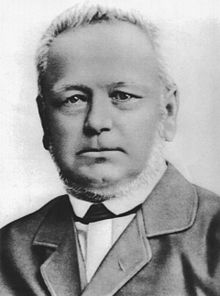Johann Adam Groh
Johann Adam Groh (born June 30, 1824 in Vielbrunn , Odenwald ; † October 3, 1881 in Bad König ) - the Odenwald peasant pastor - was a German Protestant pastor , dean and co-founder of the agricultural cooperative associations in Hesse.
family
Johann Adam Groh was the third and youngest son of the mayor and butcher Johannes Groh (1794–1868) and his wife Eva Elisabetha, born. Brohm (1791–1876), born June 30, 1824 in Vielbrunn. The ancestry of his family can be traced back to Grohmühle near Bad König.
Live and act
Even in elementary school, Groh distinguished himself through special achievements and was therefore recommended to the secondary school in Michelstadt on the advice of his teacher and the local pastor. From here he went to the grammar school in Darmstadt, where he passed the final exam in autumn 1843. Then Groh studied theology in Gießen and attended the seminary in Friedberg from 1847 to 1849 . During his studies in 1845 he became a member of the old Gießen fraternity Frankonia . Parallel to his theology studies, he was impressed by Justus von Liebig's lectures during his time in Giessen , whose explanations, especially on modern agriculture, would keep him busy for a lifetime. Groh entered the service of the Evangelical Church on January 12, 1851 as a parish administrator and school teacher in Wilsbach near Gladenbach . On February 12, 1855 he was appointed pastor of the extensive parish of Kirch-Brombach in the Odenwald .
When Groh entered his new sphere of activity in Kirch-Brombach, the economic situation in the Odenwald was completely ruined. Due to the oppressive competition, the long-established trades in the Odenwald, especially weaving , were almost completely lost. Then there was the potato disease, which had been raging since the 1840s . As a result of all these hardships, typhoid fever appeared in various places . The Odenwald emigrated to America on a massive scale. The self-management of his extensive parish and the experiences he gained made Groh believe that the impoverished Odenwald and all of Germany can only be given thorough help by renewing and raising the economic basis of agriculture .
In order to be able to better convey the new knowledge from science and technology to his fellow citizens, he founded an agricultural wreath in 1856. Fertilization tests were carried out under his direction by farmers from Brombach . From this little wreath grew his main achievement, the establishment of the first agricultural consumer association in Hesse in 1862. Numerous other consumer associations based on his model emerged in Hessen. At the suggestion of the then district assessor Wilhelm Haas from Friedberg, these associations merged to form an association in 1873 , the second president of which was Johann Adam Groh until his death. In 1871 he got to know the then general secretary of the Raiffeisen associations von Langsdorff and consequently founded a savings and loan association in Kirch-Brombach on May 18, 1874 . In the meantime, with his participation in Frankfurt am Main, the agricultural credit bank was founded as a money settlement office. He was their second director. In order to better manage his numerous offices, he moved to Bad König in the summer of 1878, where he also took over the dean's office from 1880. After he was elected to the second chamber as a member of his home constituency , he died before the new state parliament met on October 3, 1881.
Anecdotes
There are many tales and stories about the Odenwald pastor that are still kept alive today in the Odenwald population.
- Just as Groh, as a young parish candidate, gave his first trial sermon in his home village of Vielbrunn, the Breuberg consistory is said to have given him a sealed envelope which he was only allowed to open in the pulpit and which should contain the sermon text. When Groh opened the envelope, he found nothing but a blank sheet of paper. He looked at it, turned it over, and then said the words: “Here is nothing and there is nothing. God created the world out of nothing. ”Afterwards he gave a sermon on the omnipotence of God and the learned gentlemen from the consistory were amazed at his presence of mind and well-chosen words.
- Another story comes from his time as a pastor in the Kirch-Brombach parish. At that time Groh met a farmer who was known for his backwardness and indolence. A conversation started and the farmer complained to his local priest about the poor yields on his field. In particular, he blamed the Lord God for not answering his requests and prayers. Groh replied with the usual quick-wittedness: "Praying doesn't help, there has to be crap," left the perplexed farmer and walked on.
swell
- Friedrich Höreth, History and Stories from the Odenwald, Volume I, November 1982
Individual evidence
- ^ Paul Wentzcke : Fraternity lists. Second volume: Hans Schneider and Georg Lehnert: Gießen - The Gießener Burschenschaft 1814 to 1936. Görlitz 1942, M. Frankonia. No. 5.
Web links
| personal data | |
|---|---|
| SURNAME | Groh, Johann Adam |
| BRIEF DESCRIPTION | German pastor and co-founder of the agricultural cooperative associations in Hesse |
| DATE OF BIRTH | June 30, 1824 |
| PLACE OF BIRTH | Vielbrunn , Odenwald |
| DATE OF DEATH | October 3, 1881 |
| Place of death | Bad König , Odenwald |
